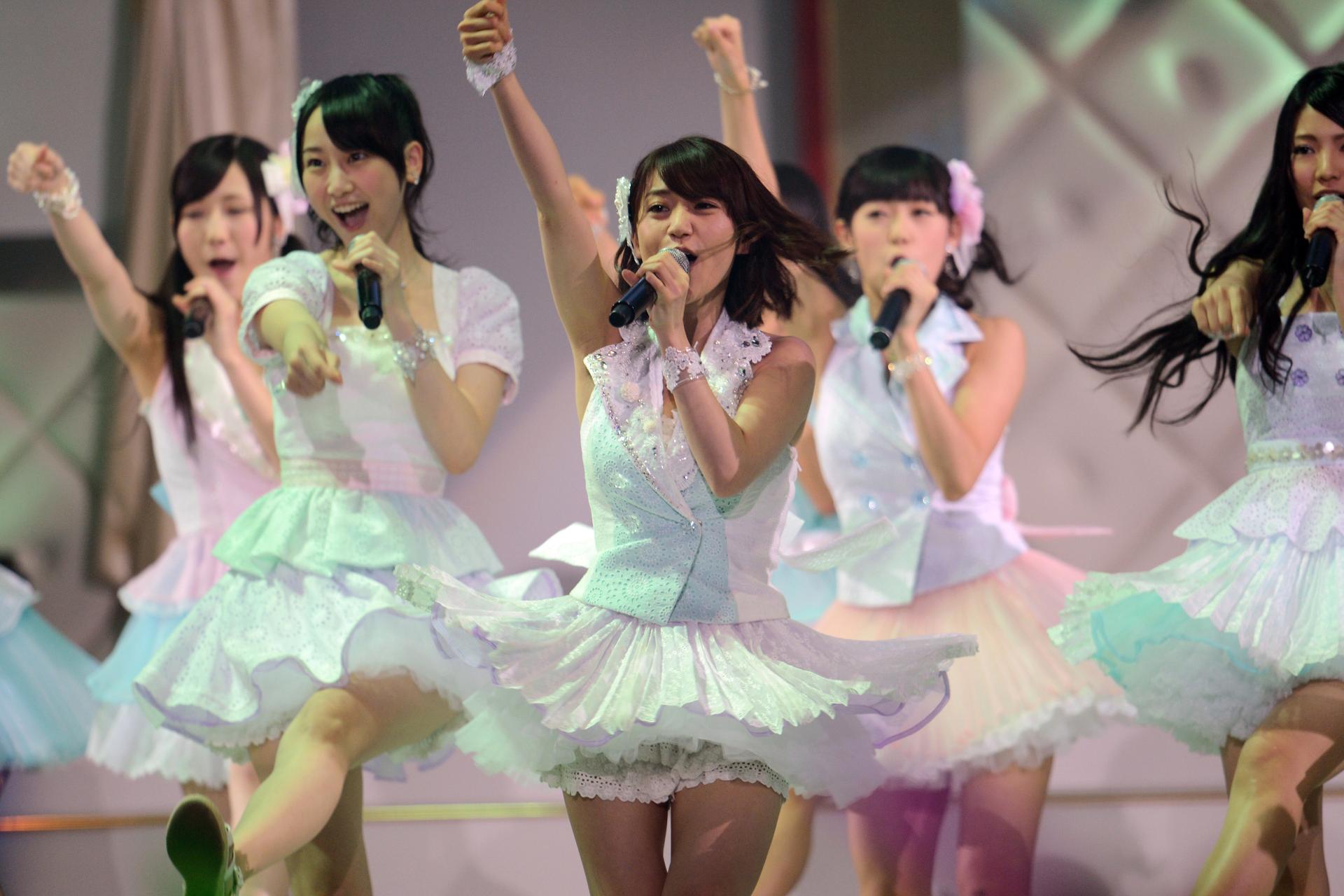My teacher, the J-pop idol
A pop group performs in a Japanese version of “American Idol” called “AKB48 General Election.”
FUKUOKA, Japan — With declining enrollments at his junior college, Tokutaro Ushijima thinks he’s found one way to attract more students: pop idol training.
The political philosophy professor at Nishi-Nippon Junior College, a two-year school in the southern city of Fukuoka, has found his cause celebre by starting the unconventional “Department of Media Promotion.”
In its third year, Ushijima oversees 32 teenage and 20-something girls who seek celebrity and glamour. Every day, the young women in this department train for hours in two girl bands, a modeling troupe, and in a TV broadcasting studio.
The curriculum may sound odd, but Ushijima, 61, argues it’s a necessity for the college’s survival. Japan, once a hub for hyper-competitive admissions, has been hit hard by an aging population and shrinking birthrate.
"A lot of universities are having a hard time with their enrollments," he said.
The demographic decline means universities are locked in fierce competition for a withering pool of prospective students — even if it requires a rendezvous with the Japanese pop music, or J-pop, industry.
“It’s hard work, but the specialized training is what I wanted, and that’s why I didn’t go to a traditional university,” said Suzuka Yawata, 18, a former child actress who put up the tuition money in hopes of becoming a runway model.
Ushijima isn’t the only one tinkering with eccentric coursework. In 2010, Kyoto Seika University, a school in the city of Kyoto, began offering master’s and doctoral degrees in the study of manga, Japan's wildly popular comic arts.
In April 2013, the university took the endeavor a step further, opening a pop culture department that coaches undergraduates in rock, hip-hop and fashion design.
It’s a growing trend in a country where, outside an elite handful of universities, many schools are struggling to lure students away from competitors. Throughout the 1990s and 2000s, the tertiary education system was one victim of a stagnated economy, a phenomenon made worse by an aging population and low birthrate.
Last year, Japan was home to 1.2 million 18-year-olds, a fall by close to half the 2 million in 1991, according to government statistics. But over the same period, the number of freshmen enrolled at four-year universities each year stayed at 500,000 to 600,000.
Some schools have already felt the sting. At least 10 large public universities have merged in anticipation of a population decline to 7 million college-aged people in 2020 from 20 million in 1995.
More from GlobalPost: K-pop's dirty secret
But scholars say they’re alarmed that experimental degrees, which are gaining a footing in Japan, are cankering educational standards in a society that values high achievement.
The students who benefit from the trend are those who, in the past, would “not have enough academic ability” to pass entrance exams, said Aya Yoshida, an educational sociology professor at Waseda University in Tokyo.
Increasingly, the teenagers vying for spots at lower-ranked universities can skip the tests, which were once a tool nearly everywhere for upholding admissions standards, Yoshida said. But she added that, since the list of fields considered “academic” is constantly evolving, the trend toward pop culture isn’t a bad sign by itself.
The situation signifies a contrast from the 1980s, when the government kept a close eye on college admissions. When the demographic decline started in the early 1990s, authorities deregulated Japan’s education industry in an attempt to force universities into competition and to move the education system away from the old style of rote memorization.
In the bigger picture, a dwindling number of rigorously educated workers could hurt the country’s prospects for economic reinvigoration. In the 1980s, Japan was a technological powerhouse whose clout has since waned.
In January, Prime Minister Shinzo Abe unveiled a stimulus plan that he said will fire up the sputtering economy. But skeptics say the demographic imbalance — and resulting shortcomings it’s imparted in universities, the workforce, and large corporations — will hold back Japan from reaching its old glory days.
Nevertheless, Japan is still home to many of the world’s finest institutions of higher education, and experts say the falling standards are overwhelmingly afflicting non-elite hubs, many of which are not run by the government.
The University of Tokyo, for instance, ranks No. 1 for the 2012-2013 academic year among Asian universities, and No. 27 worldwide in the Times Higher Education Supplement World University Rankings. Kyoto University and the Tokyo Institute of Technology rank Nos. 7 and 13 in the region, respectively.
Rather, Japan has fallen into the educational precipice that a few other Asian countries are approaching. South Korea and China will see a similar population dwindling that could unleash cacophony on its university systems, according to a 2012 report by the Organization for Economic Cooperation and Development (OECD), the club of developed countries.
Tokyo, some say, is merely at the front of the line. It is a reality that Ushijima, the J-pop professor in Fukuoka, has accepted to keep his junior college afloat.
More from GlobalPost: Japan's yakuza gang wars
